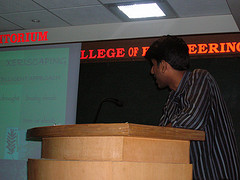Rajasthan
Map: International Groundwater Resources Assessment Centre's global overview of salinity in groundwater
Posted on 19 Aug, 2009 10:20 AMIn India, salinity has three types of genesis - one, by dissolution (areas concentrated in Kutch, North Rajasthan and bordering Punjab, South Rajasthan and bordering areas of Madhya Pradesh and parts of Western Uttar Pradesh; two, by irrigation (areas concentrated in the Deccan Peninsular region of Andhra Pradesh, Karnataka and Tamil Nadu) and parts of Orissa and West Bengal; and three, by late
CGWB's district groundwater atlas of Rajasthan
Posted on 14 Aug, 2009 01:00 PMCGWB's groundwater atlas all the basic information regarding Rajasthan's groundwater including the following:
Transfer of power to rural communities : Initiative by Sambhav Trust
Posted on 29 Jul, 2009 01:29 PMThis article is about an experiment taken up by Sambhaav Trust with communities in Barmer (district of Rajasthan), which tells us about the development of the rural area and how to bring about self sustainability to rural society. Readers may kindly write in with their feedback in the comments or to portal@arghyam.org. Comments & emails will be forwarded to Sambhaav Trust by the India Water Portal.
Introduction
The word rural is synonymous with backwardness in the eyes of the upper urban community. A general impression that has been created is that people living in rural areas are economically poor, uneducated, do not have any sense of business, are not hardworking and hence they are much below those who live in urban areas who are monetarily rich. This perception is a biased one. We have never asked ourselves - what are the indicators that make a man backward or advanced? We have measured everything in terms of monetary advancement. In our experience there are a number of indicators one can associate with development like social, political, value system etc. It is therefore important that we check our perception before we talk of rural development. We are not debating on the urban-rural divide. However, from our experience in the rural field we believe that if we are interested in national development and not just sectoral development, then it is essential to assess the potentiality of the rural sector to move forward. Our contention is that this potentiality has not been probed into. On the contrary, a policy to downgrade this sector continues year after year. We have to broaden our perception if we truly want a just state.
Malviya National Institute of Technology, Jaipur, presents integrated water management in college campus using a mix of traditional and modern concepts
Posted on 09 Jun, 2009 11:37 AM This presentation by Himanshu Raj and Neelam Verma of Malviya National Institute of Technology, Jaipur draws upon traditional and modern c
This presentation by Himanshu Raj and Neelam Verma of Malviya National Institute of Technology, Jaipur draws upon traditional and modern c
National water policy and state water policy of Assam, Himachal Pradesh, Karnataka, Kerala, Madhya Pradesh, Maharashtra, Punjab, Rajasthan and Uttar Pradesh
Posted on 02 Jun, 2009 10:33 AMNational water policy, 2002 Read policy
National water policy, 1987 Read policy
Farmers participation in management of irrigation systems act of Tamil Nadu, Rajasthan, Orissa, Maharashtra, Madhya Pradesh, Chhattisgarh and Andhra Pradesh
Posted on 01 Jun, 2009 03:39 PMTamil Nadu farmers mangement of irrigation systems act, 2000
The act provides for farmer's participation in the management of irrigation systems and for matters connected therewith or incidental thereto. The act provides for the delineation of Water Users Association area on a hydraulic basis, which may be administratively viable. Every Water Users Associations area shall be divided into territorial constituencies, which shall not be less than four, but shall not be more than ten, as may be prescribed.
Heavy water plant in Kota, Rajasthan, makes effort to reduce its environmental footprint (2007)
Posted on 29 May, 2009 10:49 AMThis presentation describes the efforts made by the Heavy Water Plant at Kota at environmental footprint reduction.
Water conservation efforts by Hindustan Zinc Limited, Chanderia, Rajasthan
Posted on 28 May, 2009 03:52 PMThis presentation describes the efforts made by HIndustan Zinc Limited at water conservation.
Environmental management efforts (2007) by JK Tyre's Kankroli plant (Rajasthan)
Posted on 28 May, 2009 03:35 PMThis presentation describes the efforts at environmental management at JK Tyres, Kankroli, plant.
Water conservation initiatives (2007) at Mico Bosch, Jaipur, Rajasthan
Posted on 28 May, 2009 11:15 AMThis presentation describes the efforts undertaken by Mico Bosch - Jaipur at water conservation. Water conservation measures taken by this manufacturer of fuel injection pumps for the automotive industry come under the broad heads of reduction in specific water consumption, community partnership & campaigns, and conservation, recycling & auditing.
This, in a larger framework that includes the use of non-conventional energy sources; technology upgradation and increases in usage efficiency; monitoring, auditing and awareness initiatives; resource use minimization and recycling; tree plantation; the minimization of green house gas emissions, vendor/supplier audits and awareness drives for employees and society at large. A zero waste water discharge unit since inception, the plant recycles waste water for both process and gardening needs.